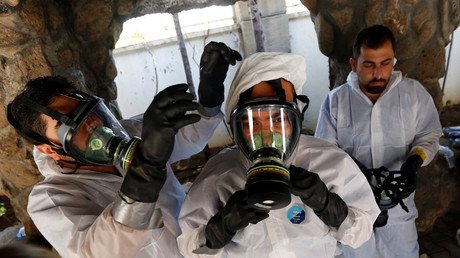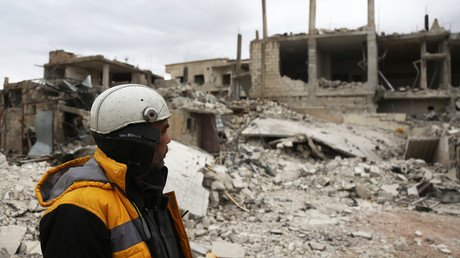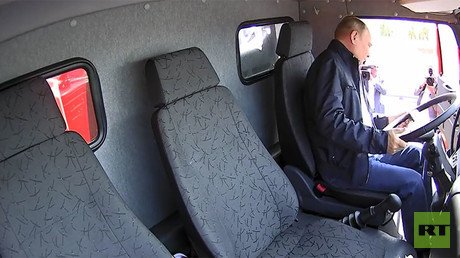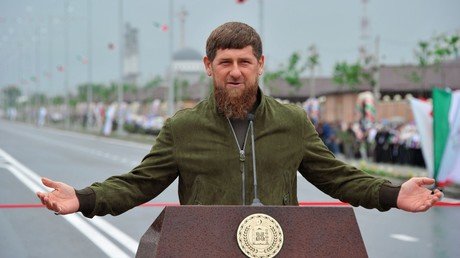OPCW says chlorine 'likely' used in Syria based on open-source info & samples provided by jihadists
The OPCW report claiming that chlorine was "likely used" in Saraqeb, Syria in February is "seriously misleading" because its narrative is based on evidence provided by jihadists, the former UK ambassador told RT.
A fact-finding mission (FFM) of the Organisation for the Prohibition of Chemical Weapons (OPCW) on Wednesday published a report which "determined that chlorine, released from cylinders through mechanical impact, was likely used as a chemical weapon on 4 February 2018 in the Al Talil neighborhood of Saraqib" in the Idlib province of Syria. Eleven people were treated after the attack for mild and moderate symptoms of toxic chemical exposure, the OPCW said in a report on its findings.
READ MORE: Biased media coverage of ‘chemical attack’ in Syria could provoke a dangerous new war
The FFM based their conclusions on a number of factors, namely the presence of two empty cylinders, which allegedly earlier contained chlorine as well as patients who were admitted to medical facilities after the reported incident. The report also states that the FFM never made it to the site of the alleged attack and relied solely on 'evidence' provided by three NGOs, two of which are based overseas. Despite the compelling narrative of the OPCW, the former British ambassador to Syria, Peter Ford, characterized the report as "seriously misleading" and "deeply disturbing."
"The mission was supposed to be fact finding, but when you actually read the 34 pages of the report, you discover that there are no facts in it at all – not one fact which is supported by independent observers," Ford told RT.
"You hear ridiculous claims such as, 'we heard barrel bombs being dropped from helicopters.' Well, I'm sorry that is a physical impossibility. And the report is full of idiotic statements like this that even a child could discard."
In fact, the entire OPCW account is based on witness testimonies and material evidence provided by selected NGOs as well as medical records offered by the same questionable sources, including Belgium-based Same Justice/Chemical Violations Documentation Center of Syria (CVDCS), the notorious Syrian Civil Defence (SCD) – better known as White Helmets – and the US-based Syrian American Medical Society (SAMS).
Ford noted that the White Helmets are a "well-known jihadi auxiliary who have assisted in beheadings and who are notorious for making propaganda," and that SAMS shares "a similar reputation."
“Dr. Morad is here today to be an inspiration to all of us." Today, 1 year after the sarin gas attack on Khan Sheikhoun, UN Ambassador @nikkihaley delivered remarks at a UNSC briefing on chemical weapons w/Dr. Morad as her guest. SAMS has recorded almost 200 such attacks in 7 yrs pic.twitter.com/NUHGK70U5A
— SAMS (@sams_usa) April 4, 2018
Other relevant information for the international chemical watchdog was gathered from "open-source media" because "various constraints," mainly related to security, prevented "immediate access to sites by the FFM."
"Believe it or not the inspectors did not go to the… alleged scene of the crime. Why? Because it is in the hands of jihadists. That is why they did not go," Ford said. "These people are totally affiliated with the jihadists, yet the inspectors accepted at face value their samples which could have come from absolutely anywhere."
While the OPCW did not assign responsibility for the attack, the White Helmets and SAMS have previously pointed the finger at Damascus.
Nevertheless, the inconclusive OPCW findings in the Saraqeb incident will likely be used to further back the narrative of the US and its allies, who repeatedly used claims by the White Helmets, SAMS, and other questionable sources to unequivocally pin the blame on President Bashar Assad. Chemical 'incidents' were also used as a pretext to strike government facilities in Syria in April 2017, and again as recently as last month.
READ MORE: Terrorist capabilities laid bare in an Eastern Ghouta chemical lab
"There are signs in the report of partiality," Ford told RT. "I'm sure that attempts will be made to exploit this very inadequate report."
If you like this story, share it with a friend!
















